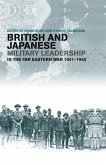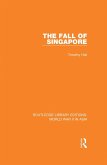The Japanese contributors examine the reasons for their forces brilliant advances in 1941-42, whereas the British writers have to account for the disastrous defeat, characterized by the poor leadership of senior commanders such as Bennett and Percival. Between 1943 and 1945, the tables were turned dramatically, so the failure of Japanese command decisions then comes under critical scrutiny and the British have to explain how defeat was transformed into victory.
Using both archival and published sources, Japanese scholars are now in a position to reappraise their war leaders, including Tojo and Mutaguchi, from a much more critical standpoint than was possible previously.But it was their flawed command "system," ultimately involving the emperor, that was most at fault.
Although certain aspects of the British campaigns have already received saturation coverage, this book provides new perspectives on the failures of Allied leadership in Malaya and Burma; the morale and fighting spirit of the British forces in the heroic struggle for Imphal and Kohima; and the all-important role of British and US air power. Not least, General Sir William Slim's remarkable achievement as commander of XIV Army is critically assessed but found to be fully deserved. Above all, this volume should stimulate interest in different methods and styles of military leadership inview of the contrasting approaches of the British and Japanese in World War II.
Dieser Download kann aus rechtlichen Gründen nur mit Rechnungsadresse in A, B, BG, CY, CZ, D, DK, EW, E, FIN, F, GR, HR, H, IRL, I, LT, L, LR, M, NL, PL, P, R, S, SLO, SK ausgeliefert werden.









